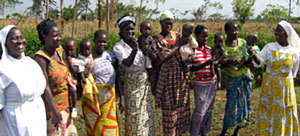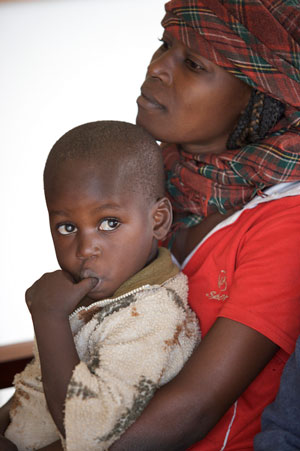Ugandan mothers with their healthy babies, beneficiaries of Global Partnership on Output-Based Aid, supported by Australia and the World Bank. Photo: Global Partnership on Output-Based Aid
Australia and the World Bank continue to strengthen their cooperation in Sub-Saharan Africa, with the World Bank assisting Australia as it expands its activities in the region. The World Bank partners with 48 countries in Sub-Saharan Africa and has a portfolio covering multiple sectors, from trade and transportation to agriculture, energy, education, health care, and water and sanitation.
In 2011–12 Australia provided funding of $5.9 million to the World Bank to implement programs across a number of sectors and countries, bringing the multi-year investment to nearly $50 million.
Throughout 2011–12, the World Bank and Australia have been working together to:
- strengthen mineral tax administration in Cameroon, Namibia and Uganda, building on initial World Bank projects in Ghana, Liberia and Mali
- support procurement reform in the mining sector in Burkina Faso and Liberia
- provide treated water supply to approximately 64,000 people in Mozambique
- help accelerate water and sanitation coverage in African towns, including developing financing strategies to scale up sanitation solutions.
Decentralisation in Kenya
Devolving powers and responsibilities from central to subnational governments is always complex. Australia is working with the
World Bank to help Kenya carry out this politically sensitive but popular reform.
The decentralisation and devolution reforms [external website] will improve the distribution of public finances, which will result in more equitable access to health and other services.
Australia is providing technical expertise to this process, much of it developed through its own longstanding domestic experience with cooperative federalism.
This includes contributions from a former Australian Grants Commission Chair, who has provided advice on intergovernmental finance.
Award-winning health care project in Uganda
The partnership between Australia and the World Bank in Africa is improving the provision of maternal health and sexual health services. Photo: Kate Holt, Africa Practice for AusAID
Health care, specifically maternal health care, is vital in reducing poverty. With the second highest fertility rate in the world, and the average woman undergoing seven pregnancies, maternal health is key to Uganda's national approach to health. Maternal and perinatal health conditions account for more than 20 per cent of the total disease burden in the country.
Australia and the World Bank are working through the Global Partnership on Output-Based Aid, and with Marie Stopes International Uganda, to implement a program where women buy vouchers for reproductive and sexual health services and sexual health from private hospitals, clinics, nursing homes and midwives' facilities. Each voucher costs much less than families would normally pay.
Training and service provision has resulted in 59,000 safe births. It has also resulted in more than 30,000 sexually transmitted disease treatments. This project won an International Finance Corporation award in recognition of the impact that cooperative partnerships can have on achieving transformative development results.


